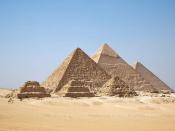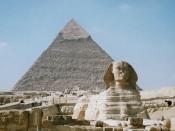"Come to me, by all means, my dear good friend, as soon as you
receive this. Come and help us to rejoice. At last, by long persevering
diplomacy, I have gained the assent of the Directors of the City Museum,
to my examination of the Mummy -- you know the one I mean. I have
permission to unswathe it and open it, if desirable. A few friends only
will be present -- you, of course. The Mummy is now at my house, and we
shall begin to unroll it at eleven to-night.
Yours, ever,
PONNONNER." (Some Words With a Mummy, Edgar Allan Poe) Mummies originate in Ancient Egypt, where the process of mumification is a way of preserving one's self for the afterlife. Ancient Egyptian's beliefs regarding a afterlife highly influence their death and burial customs.
Ancient Egyptians are said to be of both African and Middle Eastern descent.
Egyptians, alot like there origin, where very mixed in there gods also. Archeaologists have found more than 2,000 names of gods written in limestone, on walls, and papyrus. Pharaohs were also thought to be gods, brought down by Re only to return after death and preservation. However, the most important god of all was Re or the sun god. Praised every morning as the sun rose and mourned for every sun set, the sun god was loved and worshiped by almost everyone. Statues of the pharaoh's favorite gods were kept deep inside temples and cared for by high priests. Supposedly, the god's spirit lived inside the statue. After chanting and burning incense, gods were bathed, dressed, and presented with food. Another religious tradition included telling the stories
(sometimes in song) of different gods, performed ussually by priests. For egyptians, these tales provided comfort and guidance.
In about 725...


